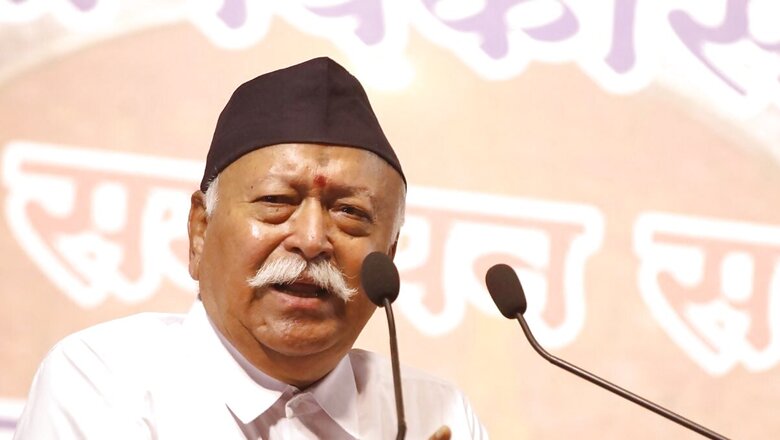
views
The call for a caste census in India has sparked a complex and multifaceted debate, with various political and social entities advocating for it from different perspectives. On one side, Opposition parties such as the Congress, JD(U), RJD, and Samajwadi Party are pushing for a caste census as a means to address socio-economic disparities and ensure fair representation in public institutions. Their demand is deeply rooted in the belief that accurate caste data is essential for formulating effective policies and affirmative action programs that can uplift marginalised communities. This political agenda is seen as a strategic move to mobilise support from these communities against the BJP and create larger political narrative.
In stark contrast, the Rashtriya Swayamsevak Sangh (RSS) supports the caste census with a focus on cultural unity and development. The RSS emphasises that the data should be used solely for welfare activities and not as a political tool. The RSS argues that the census can help in identifying and addressing the needs of lagging communities, thereby fostering social harmony and development. This approach is grounded in the Sangh’s long-standing commitment to cultural cohesion and national unity.
The divergence in motivations and intended uses of the caste census data between the Opposition and the RSS highlights the need for a clear distinction between political agendas and developmental objectives. While the Opposition’s demand is intertwined with their electoral strategy, the RSS’s support is framed within a broader vision of social welfare and cultural unity. This fundamental difference underscores the importance of maintaining a clear boundary between political exploitation and genuine developmental efforts.
Distinct Motivations and Objectives: A Closer Look at the Caste Census Debate
The demand for a caste census in India has ignited political debate, with the Opposition parties and the RSS taking distinct stances. The Opposition’s approach to the caste census is deeply political, aiming to leverage the data to highlight inequalities and rally marginalised communities. However, the RSS’s stance calls for caution, advocating that the data be used for targeted welfare programs and not electoral strategies. Critics warn that a caste census could deepen social divides, and there is a legitimate concern that using caste data for political purposes might exacerbate these divisions.
To strengthen their case, the Opposition must clearly outline their intentions and avoid framing the caste census as purely a political move. By doing so, they can champion the cause of social justice without undermining social cohesion, balancing the political with the developmental.
Political vs. Developmental Use: Divergent Approaches to Caste Census
For the Opposition, including parties like the Congress, JD(U), RJD, and Samajwadi Party, the caste census is a strategic tool to challenge the ruling BJP and mobilise marginalised communities. They argue that disclosing caste data will expose the deep-rooted socio-economic inequalities in Indian society and create an opportunity to formulate targeted policies that address these imbalances. This push is politically motivated, seeking to galvanise support from disadvantaged groups, thereby constructing a broader anti-BJP narrative.
Opposition leaders believe that caste data is critical to shaping affirmative action programs and providing a more equitable distribution of resources. In their view, revealing the true demographic makeup of India could lead to reforms in education, employment, and political representation, benefiting marginalised communities. By amplifying the demand for a caste census, the Opposition aims to project itself as the voice of these communities, challenging the BJP’s hold on power.
However, the RSS has taken a different approach. As highlighted in a recent analysis, the RSS advocates for a caste census to be used strictly for developmental and welfare purposes, cautioning against its use for electoral gains. The RSS stresses the need to view the caste census through a constitutional and administrative lens, ensuring that the data serves the upliftment of lagging communities without being politicised. Their focus is on using the data to implement welfare programs that foster social harmony, not to exploit caste divisions for political purposes.
This divergence in intended use—political vs. developmental—reflects the broader ideological gap between the Opposition and the RSS. While the Opposition sees the caste census as a tool to mobilise marginalised communities against the BJP, the RSS warns that such a move risks exacerbating caste-based divisions in society. By keeping the census data within the framework of welfare and development, the RSS argues that India can address inequalities without fuelling political agendas.
In this context, the Opposition faces a critical challenge. If their call for a caste census is perceived as merely a political strategy, they risk alienating voters who are wary of deepening social divisions. To make their case credible, Opposition leaders must clearly distinguish between advocating for social justice and using caste as an electoral weapon. Maintaining this boundary between political motives and developmental objectives is crucial for both sides of the debate, as India grapples with the complex realities of caste and inequality in a modern democracy.
Balancing Caste Census with Social Cohesion
Historically, the Congress and other Opposition parties have had inconsistent stances on the caste census, leading to accusations of political opportunism. Previous Congress governments have been criticised for their varied positions on caste-based reservations, making their current demand for a caste census appear inconsistent.
In contrast, the RSS has maintained a consistent focus on using caste data for welfare, without political exploitation. For the Opposition to avoid accusations of hypocrisy, they must present a clear, consistent rationale for their demand, while ensuring that the census does not undermine social cohesion. Balancing this political demand with a focus on social unity is essential for credibility and responsible governance.
The author, a columnist and research scholar, teaches journalism at St. Xavier’s College (autonomous), Kolkata. His handle on X is @sayantan_gh. Views expressed in the above piece are personal and solely those of the author. They do not necessarily reflect News18’s views.












Comments
0 comment